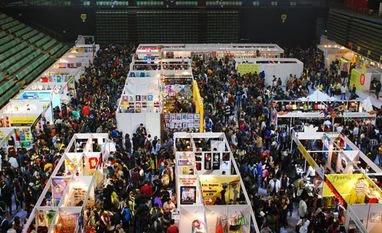A man who clearly knows a thing or two about comebacks, Shamdasani has great hopes for seeing an upturn in fortunes for the Indian comic book industry, which for the last decade has has been in a state of freefall.
In the capital for the Delhi Comic Con 2015, an upbeat looking Shamdasani said the Indian market is one with great potential.
"I feel you are going to see a real boom coming out of India in terms of creation and in terms of Intellectual Property," he said amidst a hectic autograph and interaction session with fans at the convention.
In the mid-2000s, Indian comic books in an attempt to re-invent themselves, had been repackaged with glossier pages and new art styles. This in turn led to a dramatic hike in prices, and along with a saturation of western films and TV, led to plummeting readership figures.
"I think the decline in readership is generational. I think what happens in any industry is ebbs and flows and that is what you are witnessing right now," Shamdasani said.
He further cites examples of the Japanese and American comic book markets which had witnessed a similar flux, emphasising that the key to bringing back readers is quality output.
"The same thing happened in the Japanese and the American comic market. Its all about quality and now what I think is happening is the American characters are becoming global because of movies and television shows and that is inspiring all the Indian publishers to come up with better material," he said.
"I think Indian fans have a proper taste and if they see good material, they like it. It is the same thing as in the American and Japanese markets. I think it is a market with a ton of potential. And I think you are going to see very quickly that potential come to fruition," he said.
As the CEO of one of the biggest comic publishers in India, Shamdasani has ambitious plans lined up and is looking to play a part in unearthing new talent here.
"I hope Valiant as a publisher can help that happen. We have already been talking to several publishers and artists here about giving ideas and taking ideas. We should build a bridge now between America and India in terms of comics," he said.
Shamdasani feels that events like Comic Con also provide a platform for young graphic artists and writers to be a part of the industry.
"Events like these certainly help in getting out quality stuff. Publishers, including American ones have to be involved now. I think one of the things I have been hearing here over and over again is how do I break in to the industry?"
The answer, he said, is adopting an unstinting routine of hard work, emphasising that the the work of a writer or an artist is a continuous process.
"You want to be a writer or an artist, you have to train everyday. You have to work it like a muscle. Artists like Ty Templeton have been training for over 35 years. One of the best ways is to get encouragement from people who have done it before.
"People like Ty and publishers like Valiant need to come and show people that it is not a God's gift. I think the quality will come from that," he said.
You’ve hit your limit of 5 free articles this month.
Subscribe now for unlimited access.
Already subscribed? Log in
Subscribe to read the full story →

Smart Quarterly
₹900
3 Months
₹300/Month
Smart Essential
₹2,700
1 Year
₹225/Month
Super Saver
₹3,900
2 Years
₹162/Month
Renews automatically, cancel anytime
Here’s what’s included in our digital subscription plans
Access to Exclusive Premium Stories Online
Over 30 behind the paywall stories daily, handpicked by our editors for subscribers


Complimentary Access to The New York Times
News, Games, Cooking, Audio, Wirecutter & The Athletic
Business Standard Epaper
Digital replica of our daily newspaper — with options to read, save, and share


Curated Newsletters
Insights on markets, finance, politics, tech, and more delivered to your inbox
Market Analysis & Investment Insights
In-depth market analysis & insights with access to The Smart Investor


Archives
Repository of articles and publications dating back to 1997
Ad-free Reading
Uninterrupted reading experience with no advertisements


Seamless Access Across All Devices
Access Business Standard across devices — mobile, tablet, or PC, via web or app



)
